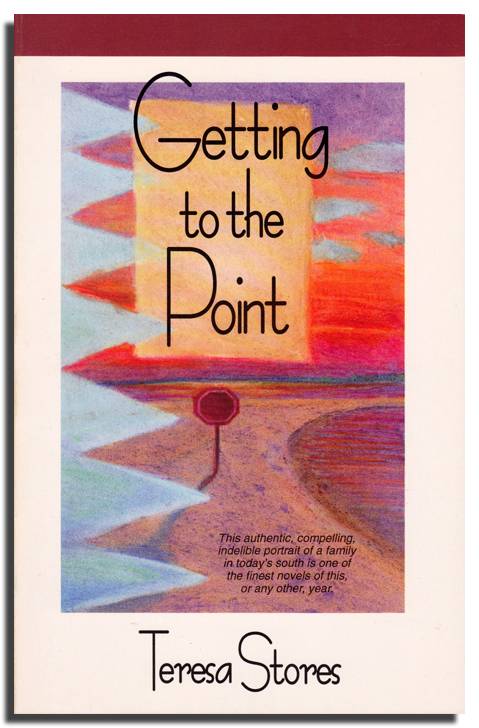Getting to the Point
Teresa Stores
Publisher’s Note
In this authentic, compelling portrait of a family in today’s south, Dix must confront her family’s disappointment in her lesbian lifestyle and meet the challenge issued by her forthright lover, Sarah.
—
From Publishers Weekly
What’s the point? Whatever it is, Stores’s first novel doesn’t make it. Dix, a lesbian in flight from her family, returns to her hometown, Point Will, Ga. as her grandmother nears death. Her lover, Sarah, joins her unexpectedly, shaking up the family’s patterns and forcing them to acknowledge her relationship with Dix. Unfortunately, while Sarah is intended to be a sympathetic character, her intentions and actions are intrusive, disruptive and destructive. As family members endure one implausible life-threatening event after another, Sarah spouts advice more suited to self-help manuals than to dialogue. But Sarah is not the only ill-drawn character: the entire family falls victim to Stores’s broadly stereotypical rendering of characters and their interior monologues, executed in hokey dialect. None of them is particularly sympathetic, perhaps because what interiority they have is as labored and overemphasized as the repetitive pun made of ‘the point.’ Nonetheless, there are some moving moments, suggesting that Stores has the potential to write a novel that interweaves structure and narrative. This is not that novel.
Copyright 1995 Reed Business Information, Inc.
From Library Journal
These two first novels illustrate how tricky and delicate it is to go home again out of family obligation and concern and to hang onto your self-respect once you get there?especially when you’ve been estranged from your parents for a long while not for what you’ve done but for who you are. This is exactly the situation that Dixie faces in Getting to the Point. Dixie’s grandmother is dying, so she goes home to help care for her over the summer. But her father, Ed, an insecure, self-righteous bigot, has never forgiven Dixie for ending her marriage and living as a lesbian. As a result, he alternates between hostility and coldness during Dixie’s visit. In this climate, no healing or reconciliation will ever take place. But Dixie begins to speak up for herself, supported by her mother, her grandmother, and her lover, Sarah. Unfortunately, though Stores is good at creating tension between characters through dialog and plot line, her writing isn’t very polished, and her characters are often stereotypes or caricatures. Still, the issues she raises about healing old wounds are important. In Amnesty, Maura goes home to bury her father. Like Dixie, she is ambivalent about returning since her parents threw her out of the house 13 years earlier for having had a relationship with a high school girlfriend. Shifting back and forth from the late 1960s up to the late 1980s, this book describes Maura’s brother’s exile to Canada to avoid the draft during the Vietnam War as well as her own exile several years later. In both cases, her father, a lonely, bitter man who has retreated into alcohol, disapproved of and rejected his children. Maura can’t reconcile with him now, but she may be able to make peace with her mother and brothers. Or can she? Blum’s writing is polished and strong. She makes the sadness and emptiness of her characters so real that readers are pulled right into the story as it unfolds. This is the first novel for both writers, although Blum has been published before in three anthologies. Recommended for general readers.?Lisa Nussbaum, Euclid P.L., Ohio
Copyright 1995 Reed Business Information, Inc.
Check for it on:
Details
| ISBN | 1562801007 |
| Genre | Fiction |
| Copyright Date | 1995 |
| Publication Date | Mar-95 |
| Publisher | Naiad Press |
| Format | Trade Paperback |
| No. of Pages | 256 |
| Language | English |
| Rating | NotRated |
| BookID | 4704 |

